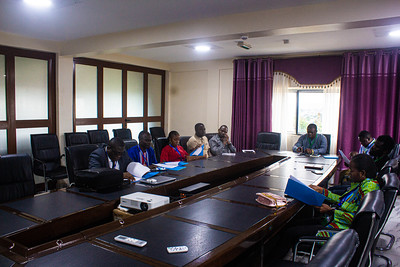The call for applications about these modeling projects targeting researchers and students was opened few months ago by CRID hosting the ACoMVeC project. The recipients recently signed their one-year grant contracts.
 On August 19th 2024, recipients of the $20,000 USD signed their one-year grant award contracts under the African Consortium in Modeling for Effective Vector Control (ACoMVeC) project. A brief ceremony was held at the CRID conference room, overseen by five members of the Operational Research Projects (ORP) committee and project management staff. The grantees were selected unanimously by a panel following the Technical Vector Control Advisory Group (TVCAG) consultative meeting in March 2024. During the ceremony, the recipients discussed the project’s objectives and vision, and formalized their commitment by signing their contracts.
On August 19th 2024, recipients of the $20,000 USD signed their one-year grant award contracts under the African Consortium in Modeling for Effective Vector Control (ACoMVeC) project. A brief ceremony was held at the CRID conference room, overseen by five members of the Operational Research Projects (ORP) committee and project management staff. The grantees were selected unanimously by a panel following the Technical Vector Control Advisory Group (TVCAG) consultative meeting in March 2024. During the ceremony, the recipients discussed the project’s objectives and vision, and formalized their commitment by signing their contracts.
The five grantees are called to work on specific projects. David Jaures Fotsa Mbogné, will work on “Modeling the impact of the level of coverage of LLIN use on malaria transmission”. Djouda Sonkoue Byliole, will deal with “Modeling the cost-effectiveness of Indoor Residual Spraying (IRS) compared with impregnated mosquito nets”. Jean Claude Kamgang, will focus on “Modeling the impact of the distribution of a single type of Long-Lasting Insecticide Treated Nets (LLINs) across the country”. Huguette Laure Wamba Makeng, will study how to “Model the risks of emergence of resistance to Artemisinin-based combination therapies (ACTs) in Cameroon”. Franklin Platini Agouanet, will be working on “Modeling the optimization of seasonal malaria chemoprevention (SMC) in Cameroon”. Each project will be funded to the amount of $4,000 USD.
According to the recommendations from the ACoMVeC Consultative TVCAG Meeting, these projects will be implemented over the next six to twelve months and aim to provide the Cameroon National Malaria Control Program (NMCP) with evidence-based insights for effective decision-making in malaria control. As a reminder, ACoMVeC is a project funded by the Bill and Melinda Gates Foundation, led by Professor Charles Wondji at CRID. Its primary goal is to enhance malaria mathematical modeling capacity across sub-Saharan Africa, with a particular focus on vector control. This three-year project is expected to generate crucial evidence to support national malaria control programs in the participating countries.






